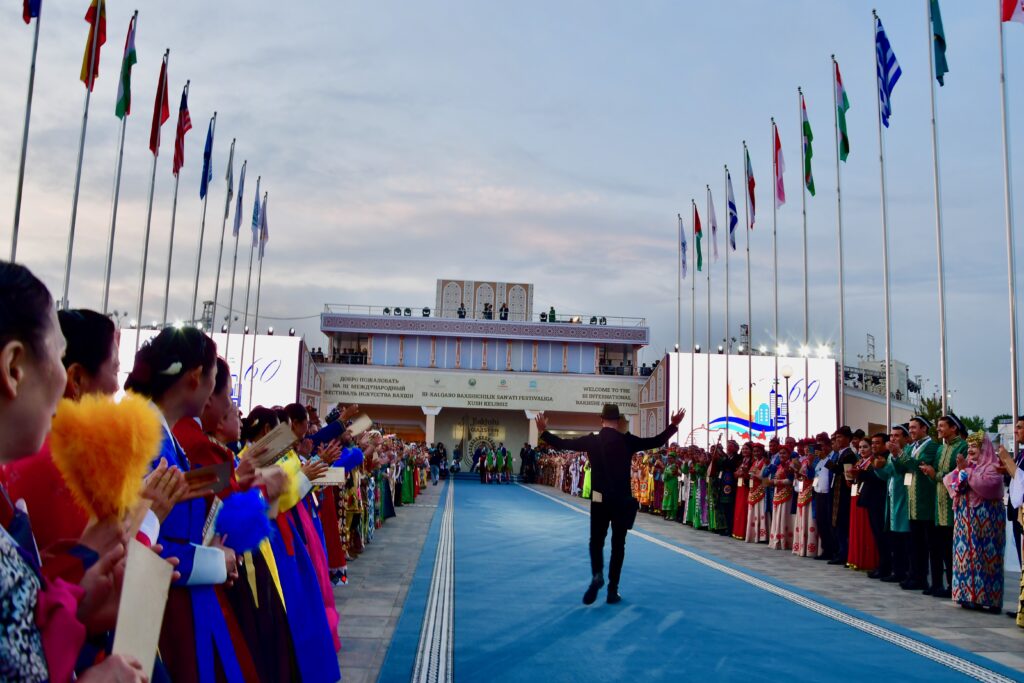THE CONTEMPORARY ART OF BAHKSHI A NEW SOUND OF THE GOLDEN
HERITAGE OF UZBEKISTAN
Uzbekistan is a country wrestling with its past and its future. Ancient historical cities where heroes such as Alexander the Great and Tamerlane walked the same smooth worn pavements as today’s tourists, need preserving, yet the country is also caught up in a headlong rush to modernity and globalisation. The balance between the demands for tradition and future are truly polarised here. It is not only the physical mausoleums, palaces and silk road fortresses that could be at risk but also the non-tangible heritage too. The folk literature, which often combines with traditional music (known here as Bahkshi), is a very important part of historical culture and is even recognised by UNESCO. Storytelling, singing and, in the past, even rallying the troops into battle was a skill, with works passed down between masters of the art. Until very recently much of that work was not written down and it is unimaginable how much of this aural cultural history has been lost over the centuries.

However today there are enthusiastic academics, scholars and performers from across the Turkic countries and beyond that are trying to maintain and reclaim the heritage. UNESCO has recognised non-tangible cultural art forms and in Guliston City, the capital of the Syrdarya region, in Uzbekistan the third international conference on the contemporary art of Bakhshi – ‘A new sound of the Golden Heritage’ was held over three days in the first week of May 2023. Alongside the conference an international Bakhshi competition was held with Musical performers from more than 40 foreign countries and international organisations gathering to showcase their talents at the festival. 64 performers, including ten local and 54 foreign artists, were selected from over 300 participants. It was a chance for performers to share their music and storytelling with each other and the wider public and the locals also revelled in the chance to take photos with Kimono clad singers from Japan, Sarong wrapped musicians from Indonesia, Bulgarian women in traditional clothes draped in golden coin jewellery, and of course the Kazakhs, Kyrgyz and Uzbeks in Shapans and Ak Kalpak added to the colour. It was a great honour for me, as Chairman of the Eurasian Creative Guild, to represent Great Britain, although at times I felt very underdressed! The pageantry was further highlighted by an epic performance of Uzbek and Turkic culture. Over 300 dancers from the local universities joined professional singers and artists in a nonstop riot of colour music and performance that thrilled the crowds and even got the visiting dignitaries on their feet dancing.
The conference itself was an opportunity to outline what Central Asian nations are doing to uphold the tradition and to promote it around the world. The conference was opened by the Uzbek Minister of Culture B.Sayfullayev and supported by the Adviser to The Prime Minister of Pakistan, Amir Muqam. Following two days of presentations and delivery of academic papers a resolution was passed to include the revival of Bakhshi Art in creative schools, and importantly the recording and cataloguing of current Bakhshi performers by using new technology to develop an international archive and use this to promote the Bakhshi arts.
The results of the competition saw accolades and prizes being awarded at an open-air public performance bringing the proceedings to a dramatic close.
During the Bakhshi festival in Gulistan City, Uzbekistan Gareth Stamp (Chairman of Eurasian Creative Guild) interviewed Maxmudaliyev Akmaljon, Governor of the Syrdarya District and one of the key organisers of the festival.
ECG – How Important is the Bakhshi Festival for The Syrdarya region of Uzbekistan?
Maxmudaliyev Akmaljon (MA) – Bakhshi folklore festival is crucial for Uzbekistan, and the first aim of having such a festival is to preserve historical traditions of art of Bakhshi. Also, we have a desire to save our unique culture, as cultural development means education and knowledge. And where there is education and knowledge, there only will be development and progress. For these, especially for Syrdarya district, and for the whole population of Uzbekistan, Bakhshi festival means happiness, and a cultural and meaningful event. For Uzbekistan, the sphere of culture is crucial, as we have the opportunity to struggle with ignorance.”
ECG – What plans for other festivals do you have in the coming months?
MA – We have big plans in the future to hold such kinds of festivals. In 2023, it will be the 60 years anniversary of Syrdarya district’s creation.
It means that from 1 January to 31 of December 2023 we will have a celebration in every home, street, administration, parks and regions. Also Syrdarya is popular for our special Mirzachol region melons, and Mirzabad region pomegranates. We have the seasonal harvest of melons and pomegranates festival, together with the celebration of our district’s anniversary – and we will definitely hold a big celebration, and will show it to the whole of the world.
ECG – What have you learnt from organising such an elaborate festival?
MA – The fact that the third Bakshi festival was held in Gulistan city, in Syrdarya, allows us to gain experience and preparation. During this preparation, we tried to pay attention to everything, especially for the development of tourism of Uzbekistan. Preparing for this festival was on the highest level, all the ministries and our president created very useful system for us. All members of our team supported each other in preparing for this event. It is now a unique experience for all of us.
ECG – It has been an amazing experience and I want to personally thank you and the organisers for the opportunity to witness the Bakhshi Festival.
MA – Hospitality is in our hearts and blood. Also I am very happy to meet with you because of this festival, and I want to add for the first question, culture unites peoples, friends and brotherhood
Text & Pictures by Gareth Stamp
